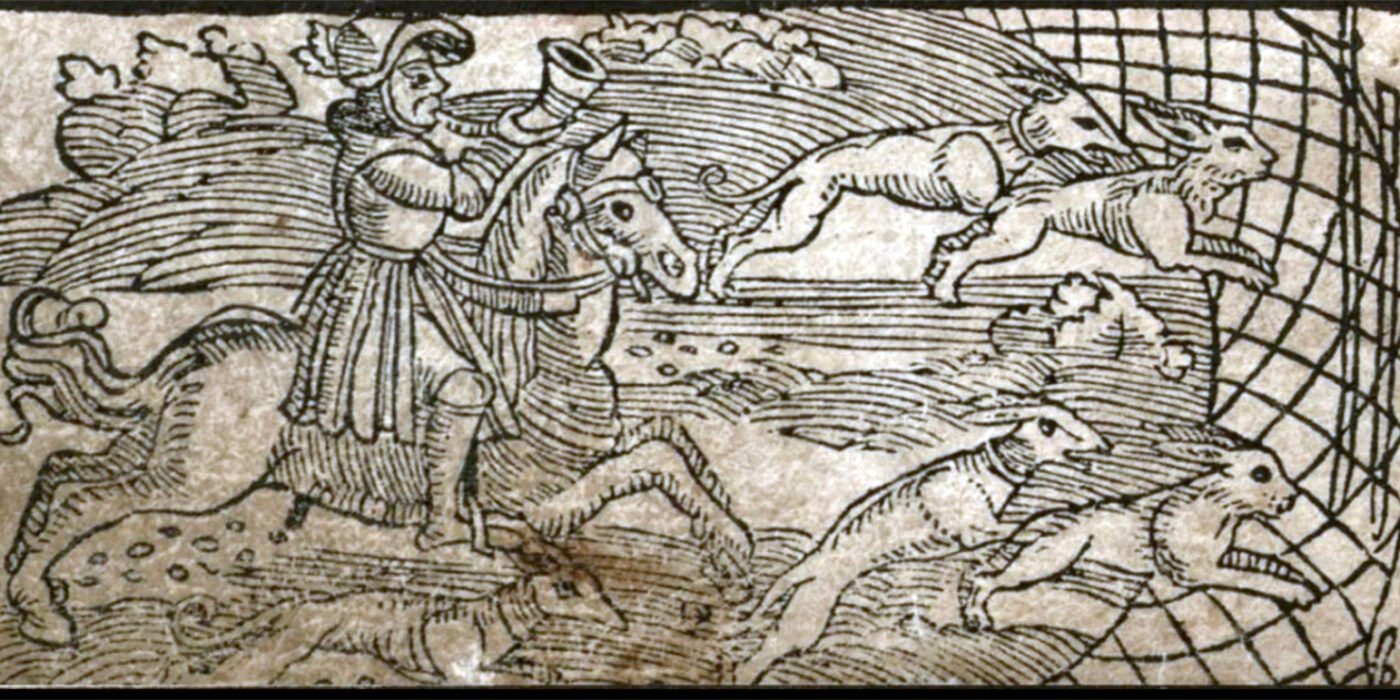(RNS) — How do you start a Seder for this year’s Passover? I am glad you asked.
This is the order of the blessings:
- Yayin: The blessing over the wine.
- Kiddush: The sanctification of the festival.
- Neirot: The candle lighting for the festival
- Havdalah: The blessing for Havdalah, which makes a distinction between the holiness of Shabbat and the holiness of Passover
- Zman: The blessing for this particular time of the year — popularly known as the Shehecyanu.
The editors of medieval Haggadot took the first letter of those blessings and created an abbreviation to help people remember the order. Put them all together, and they spell “yaken haz.”
If you speak German, it sounds like “jag den Häs,” which means “to hunt the hare.” As a result, some artists decided it would be fun to insert a scene of a rabbit hunt into the Haggadah, showing hunters chasing a rabbit into a net.
How did Jews interpret that scene? The hunters were the enemies of the Jews. The rabbit — a wily, nonkosher animal — represented the Jews being trapped in a net.
For most of my career, I thought this scene was cute, but out of date.
I was wrong. Because today, once again, Jews are being chased into traps — nets on the left, and nets on the right.
A net on the left? Here’s an example:
- Immigrants are being rounded up for deportation. This is happening to some of them because of their participation in anti-Israel agitation on college campuses. But some legitimate protests have become antisemitic in tone and have led to anti-Jewish harassment on campuses, not to mention the inability or lack of desire on the part of the universities to police such acts.
- Some will imagine that Jews will applaud these roundups (a highly debatable point).
- Therefore, they blame the roundups on Jewish influence and/or on this administration’s purported anti-antisemitism.
- And they celebrate the anti-Israel victims, and their cause, as heroic.
- Ultimately, it’s all bad for the Jews.
Another net on the left?
- Anti-Israel agitation on campus is causing cuts to university funding (but actually it’s an anti-university/anti-intellectual move on the part of the administration).
- The university’s expected reaction: “Our university no longer has the funds that it needs to engage in research, etc. It is because the Trump administration just wants to help the Jews by punishing people who are anti-Israel.”
- Bad for the Jews.
A net on the right?
- Jews tend to be liberals and progressives. At the very least, they tend to vote Democrat.
- They are also elitist, intellectual and globalist.
- Let’s blame the Jews, for whatever.
- Bad for the Jews.
Why are these nets so frightening?
Because for the past 75 years, to quote journalist Bari Weiss, American Jews have been enjoying a holiday from history.
Yes, there has always been subtle antisemitism in American life. But it is telling that when antisemitism could have erupted, it didn’t.
The late Sen. Joseph Lieberman, a pious Jew, ran for vice president. It didn’t even register a blip on the antisemitism meter. The Bernie Madoff Ponzi scheme? The Jeffrey Epstein case? By and large, no antisemitic responses, except in the darkest places of the dark web and from the hard-core Jew haters. By and large, Jews dodged those bullets.
But the bullet-dodging days ended with the shooting at the Tree of Life synagogue in Pittsburgh in 2018. Eleven Jews were killed during Shabbat morning services. Those days may have ended even earlier at the Unite the Right white supremacist march in Charlottesville, Virginia, the year before, with its chants of “The Jews will not replace us!”
And then came Oct. 7, 2023, and its aftermath, again increasing antisemitism. For American Jews, the weather report went from cloudy skies to a tornado.
Why were American Jews surprised?
To quote a rock song, it’s because many American Jews “don’t know much about history.”
But when you sit down at your Seder, you will encounter that history. The Israelites came to Egypt with Joseph; Joseph had helped Egypt thrive; the Israelites thrived — until “a new king arose who knew not Joseph.” That was how it all began to end.
That was the pattern of Jewish history: acceptance, thriving and then, the ruling class gets nervous. That is how it begins to unravel, from ancient Egypt to ancient Persia to medieval England, France and Spain. Ultimately, to modern Germany, the complacency of Germans and particularly, of German Jews.
Historian Timothy Snyder quotes an editorial in a leading newspaper for German Jews dated Feb. 2, 1933:
“We do not subscribe to the view that Mr. Hitler and his friends, now finally in possession of the power they have so long desired, will implement the proposals circulating in [Nazi newspapers]; they will not suddenly deprive German Jews of their constitutional rights, nor enclose them in ghettos, nor subject them to the jealous and murderous impulses of the mob.”
Did we American Jews think if we only put enough blood on our well-appointed designer doorposts, the twin angels, the angel of death and the angel of history, would simply pass us by?
Come with me to Humboldt University in Berlin. On May 10, 1933, about 40,000 people rallied on the grounds of the university, carrying blazing torches to ignite piles of banned books. Joseph Goebbels proclaimed: “The era of exaggerated Jewish intellectualism is now at an end and the future German man will not just be a man of books. I entrust to the flames the intellectual garbage of the past.”
Who consigned those books to the flames? Not Nazi officials. It was students and faculty members.
And not far from Humboldt University, there is a sculpture of a man sitting on a park bench. He is looking away, blithely content with his own obliviousness.
Such obliviousness and complacency are also nets or traps.
Looking back at the Haggadah illustrations, we might find them cute and endearing. We may enjoy the arcane explanations of how they got there in the first place.
But, at the very least, on this Passover, let us be aware of the nets and the traps. And let us resolve to avoid them.
Wishing a sweet, liberating Pesach to all.






